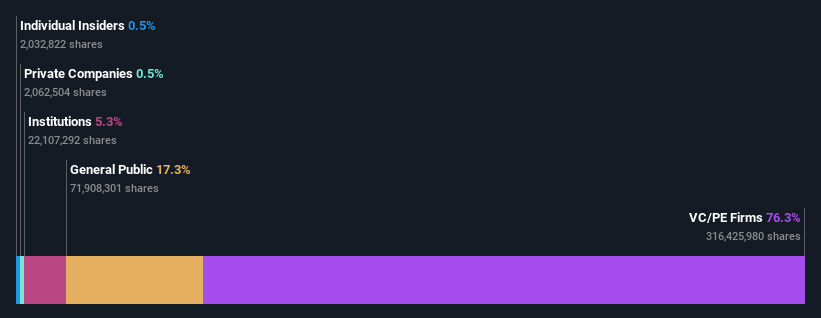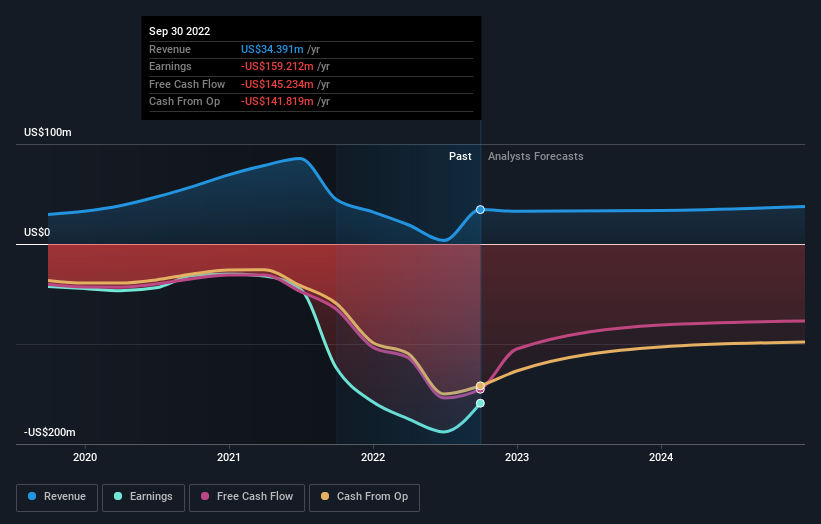Individual investors own 17% of Eargo, Inc. (NASDAQ:EAR) shares but private equity firms control 76% of the company
To get a sense of who is truly in control of Eargo, Inc. (NASDAQ:EAR), it is important to understand the ownership structure of the business. We can see that private equity firms own the lion's share in the company with 76% ownership. That is, the group stands to benefit the most if the stock rises (or lose the most if there is a downturn).
And individual investors on the other hand have a 17% ownership in the company.
Let's delve deeper into each type of owner of Eargo, beginning with the chart below.
View our latest analysis for Eargo
What Does The Institutional Ownership Tell Us About Eargo?
Institutional investors commonly compare their own returns to the returns of a commonly followed index. So they generally do consider buying larger companies that are included in the relevant benchmark index.
Eargo already has institutions on the share registry. Indeed, they own a respectable stake in the company. This can indicate that the company has a certain degree of credibility in the investment community. However, it is best to be wary of relying on the supposed validation that comes with institutional investors. They too, get it wrong sometimes. When multiple institutions own a stock, there's always a risk that they are in a 'crowded trade'. When such a trade goes wrong, multiple parties may compete to sell stock fast. This risk is higher in a company without a history of growth. You can see Eargo's historic earnings and revenue below, but keep in mind there's always more to the story.
Eargo is not owned by hedge funds. Patient Square Capital, LP is currently the largest shareholder, with 76% of shares outstanding. With such a huge stake in the ownership, we infer that they have significant control of the future of the company. With 1.5% and 1.1% of the shares outstanding respectively, BlackRock, Inc. and New Enterprise Associates, Inc. are the second and third largest shareholders.
While studying institutional ownership for a company can add value to your research, it is also a good practice to research analyst recommendations to get a deeper understand of a stock's expected performance. There is a little analyst coverage of the stock, but not much. So there is room for it to gain more coverage.
Insider Ownership Of Eargo
While the precise definition of an insider can be subjective, almost everyone considers board members to be insiders. Management ultimately answers to the board. However, it is not uncommon for managers to be executive board members, especially if they are a founder or the CEO.
Most consider insider ownership a positive because it can indicate the board is well aligned with other shareholders. However, on some occasions too much power is concentrated within this group.
Our data suggests that insiders own under 1% of Eargo, Inc. in their own names. It appears that the board holds about US$1.2m worth of stock. This compares to a market capitalization of US$254m. Many tend to prefer to see a board with bigger shareholdings. A good next step might be to take a look at this free summary of insider buying and selling.
General Public Ownership
The general public, who are usually individual investors, hold a 17% stake in Eargo. While this size of ownership may not be enough to sway a policy decision in their favour, they can still make a collective impact on company policies.
Private Equity Ownership
With an ownership of 76%, private equity firms are in a position to play a role in shaping corporate strategy with a focus on value creation. Some investors might be encouraged by this, since private equity are sometimes able to encourage strategies that help the market see the value in the company. Alternatively, those holders might be exiting the investment after taking it public.
Next Steps:
It's always worth thinking about the different groups who own shares in a company. But to understand Eargo better, we need to consider many other factors. Take risks for example - Eargo has 5 warning signs (and 4 which can't be ignored) we think you should know about.
If you would prefer discover what analysts are predicting in terms of future growth, do not miss this free report on analyst forecasts.
NB: Figures in this article are calculated using data from the last twelve months, which refer to the 12-month period ending on the last date of the month the financial statement is dated. This may not be consistent with full year annual report figures.
Have feedback on this article? Concerned about the content? Get in touch with us directly. Alternatively, email editorial-team (at) simplywallst.com.
This article by Simply Wall St is general in nature. We provide commentary based on historical data and analyst forecasts only using an unbiased methodology and our articles are not intended to be financial advice. It does not constitute a recommendation to buy or sell any stock, and does not take account of your objectives, or your financial situation. We aim to bring you long-term focused analysis driven by fundamental data. Note that our analysis may not factor in the latest price-sensitive company announcements or qualitative material. Simply Wall St has no position in any stocks mentioned.
Join A Paid User Research Session
You’ll receive a US$30 Amazon Gift card for 1 hour of your time while helping us build better investing tools for the individual investors like yourself. Sign up here

 Yahoo Finance
Yahoo Finance 

